
Assessing What Matters to Parents as Teachers Families & Children
Because the best research on parenting guided the design of the Keys to Interactive Parenting Scale (KIPS), it aligns with the best parenting curricula. After all, we drink from the same rich well of research. In the KIPS Library, Crosswalks are currently available between the KIPS parenting assessment tool and three widely used parenting curricula: Growing Great Kids, Partners in Parenting Education and the Born to Learn Curriculum. Each crosswalk serves as a map between the KIPS parenting assessment results and specific parts of the curriculum that address the improvement of the particular parenting behavior of interest. The Parents as Teachers Born to Learn Curriculum has recently been revised, and the new curriculum is called the Foundational Curriculum. This article explores the relationship of KIPS to the Foundational Curriculum.
Parents as Teachers
Parents as Teachers is a widely disseminated home visiting program. The Parents as Teachers logic model emphasizes three areas, 1) Parent-Child Interaction, 2) Development-Centered Parenting and 3) Family Well-Being. The logic model also emphasizes outcomes of “Improved parenting capacity, parenting practices, and parent child relationships.” Beyond the Parents as Teachers affiliates in all 50 states and seven different countries, 44% of Early Head Start programs and many Healthy Families America programs. choose to use the Parents as Teachers Curriculum. The Born to Learn-KIPS crosswalk, developed by Angela Rau, a Parents as Teachers consultant and trainer, showed that KIPS was a good match for the prior curriculum. Users tell us KIPS is an even better match to the new Foundational Curriculum.
The Foundational Curriculum focuses on five principal domains of parenting behavior: Nurturing, Designing/Guiding, Responding, Communicating, Supporting and Learning. So how do these domains match with what KIPS assesses? Let’s compare the five Foundational Curriculum domains to the 12 behaviors assessed by KIPS to see how they align.
Foundational Curriculum KIPS Alignment
Nurturing
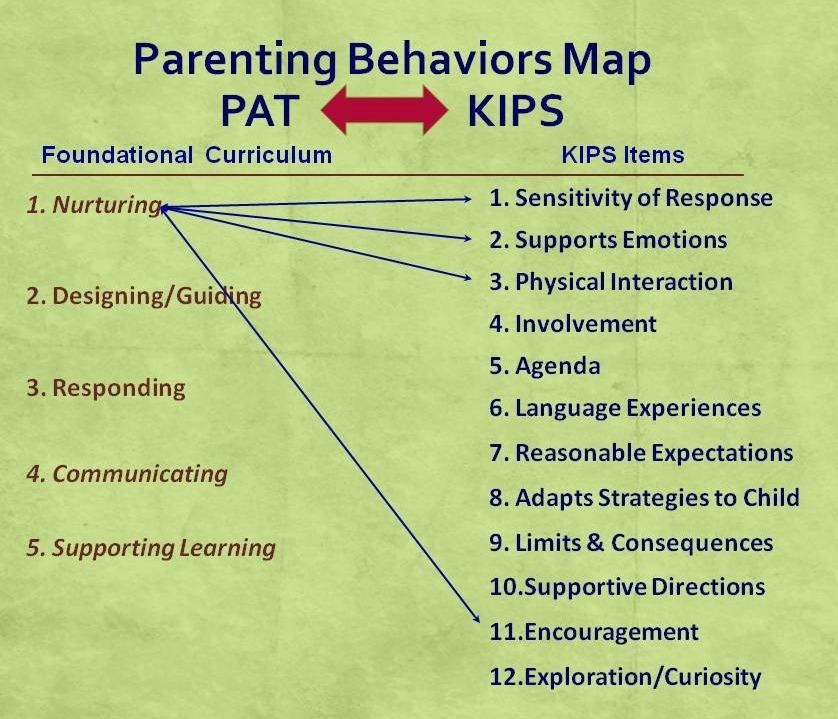
Starting with the Parents as Teachers Nurturing domain, it appears that 4 KIPS items relate most closely:
1) Sensitivity of Responses,
2) Supports Emotions,
3) Physical Interaction, and
11) Encouragement.
Designing/Guiding
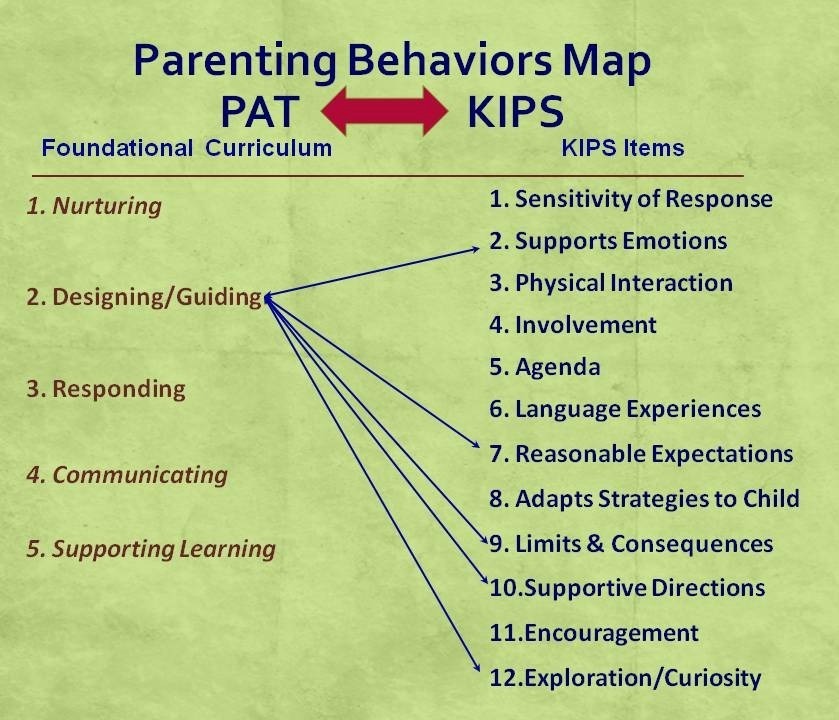
For the Parents as Teachers Designing/Guiding domain, it appears that 5 KIPS items match:
2) Supports Emotions,
7) Reasonable Expectations,
9) Limits & Consequences,
10) Supportive Directions and
12) Exploration/Curiosity. For more on exploration and curiosity, see our previous post.
Responding
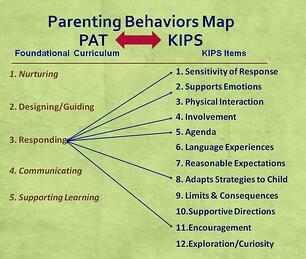
For the Parents as Teachers Responding domain, it appears that 6 KIPS items relate most closely:
1) Sensitivity of Responses,
2) Supports Emotions,
4) Involvement,
5) Agenda,
8) Adapts Strategies to Child and
11) Encouragement.
Communicating
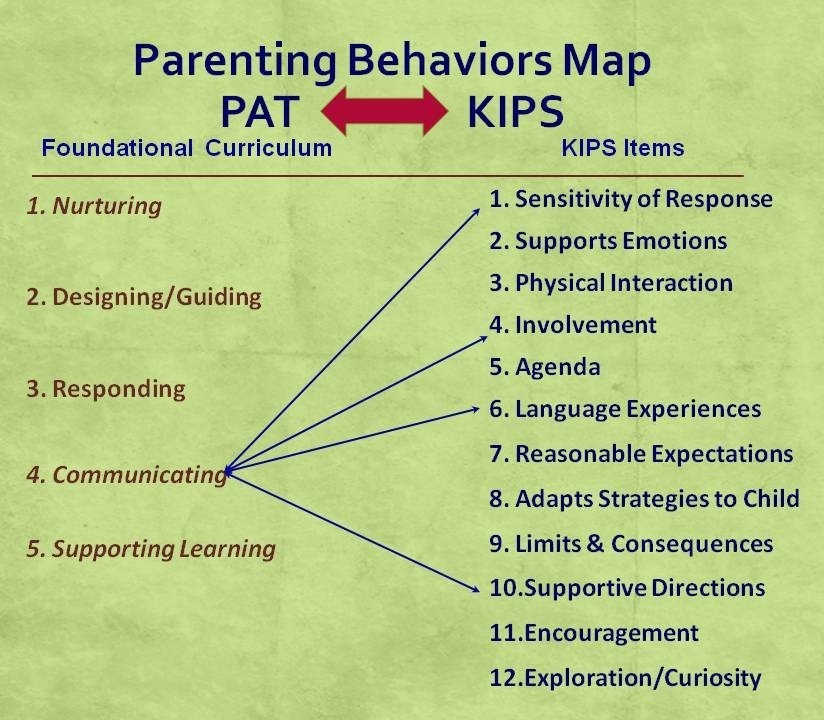
For the Parents as Teachers Communicating domain, it appears that 4 KIPS items most closely match:
1) Sensitivity of Responses
4) Involvement
6) Language Experiences and
10) Supportive Directions.
Supporting Learning
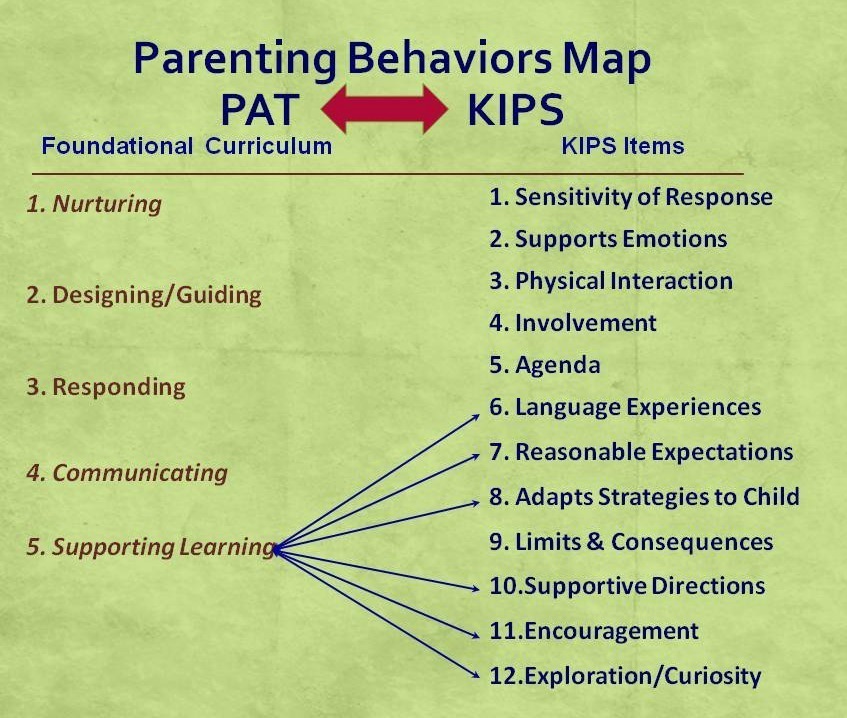
For the Parents as Teachers Supporting Learning domain, it appears that 6 KIPS items correspond:
6) Language Experiences
7) Reasonable Expectations
8) Adapts Strategies
10) Supportive Directions
11) Encouragement and
12) Exploration/Curiosity.
What Does This Mean For Programs Using the Parents as Teachers Foundational Curriculum?
Now, let’s put these together and look at the full Parents as Teachers – KIPS map!
KIPS Fits the Foundational Curriculum
The 25 arrows show how KIPS assesses the major behaviors that are the focus of the Parents as Teachers Foundational Curriculum. Also, note that each of the five behavior domains is addressed multiple times by the KIPS, reinforcing the strong alignment of the assessment with the curriculum. Furthermore, KIPS doesn’t appear to assess any aspects of parenting that aren’t included in the Foundational Curriculum; so it is efficient. Thus, if your program uses the Parents as Teachers Foundational Curriculum, KIPS assesses all five domains and yet is an efficient parenting assessment for you to use. With direct alignment to your curriculum, KIPS offers a tool to enhance observation skills and in-depth parenting services with your families. Furthermore, KIPS assesses the parenting outcomes listed in the Parents as Teachers logic model.
The five Parents as Teachers domains may seem clear, yet Supervisors tell us staff need a tool that gives them specific behaviors and language to guide parents about what they can watch for, say and do in order to interact differently with their children. Child observation tools, such as the Ages and Stages Questionnaire (ASQ) involve the parent and staff as co-observers. Similarly, parent observation tools can build the partnership between Parent and Parent Educator, with the parenting assessment serving as a coaching tool, rather than a judgment. Parents and staff can learn together about what works best for their child within the safety of their relationship. KIPS also helps staff focus their selection of activities from the extensive curriculum to work on specific needs of each parent.
Does KIPS Show that Parents as Teachers Makes a Difference?
Programs have consistently shown that KIPS is sufficiently sensitive to assess increases in parenting quality in response to services using the Born to Learn curriculum. For example, a statewide program, South Carolina First Steps to School Readiness (SCFS), ), includes sites predominantly using the Parents as Teachers model. The SCFS evaluation report showed a statistically significant 17% increase in parenting quality using KIPS over just a single school year (~7 months). These impressive results were found using the prior Born to Learn curriculum. Since users of both KIPS and the Parents as Teachers curriculum tell us that the new Foundational Curriculum is an even better fit, we can reasonably expect even larger improvements. It is too early for large scale outcomes, but anecdotal reports are very promising. In an earlier post, Choosing the Right Parenting Assessment to Delight Your Funders, we wrote about how funders are eager to see outcome data, and many require such evidence. Beyond evidence of outcomes, parenting assessment can be used to gain insights that guide services specific to each family’s strengths and needs. Thus, parenting assessment can prove useful in proving outcomes and in nurturing insights.
